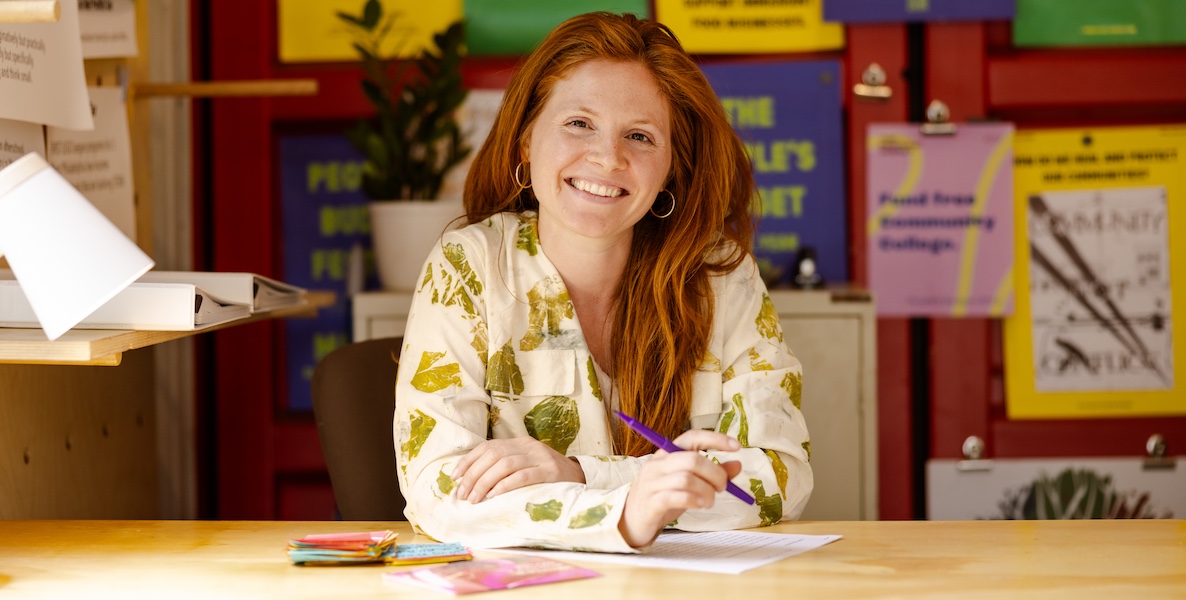Despite studying sculpture at Temple University’s Tyler School of Art and Architecture, these days, Phoebe Bachman more often builds situations and explores relationships between people than clay structures. Although she still makes collages and sews, most of Bachman’s art takes the form of a thoughtfully-structured conversation among a group of neighbors, or a workshop for painting protest signs.
Since 2019, Bachman has been an artist and project manager for The People’s Budget, an ever-evolving Mural Arts Philadelphia public artwork that brings everyday Philadelphians into the City’s complex (but critically important) budgeting process. Today, as the project lead, Bachman and her collaborators take somewhat dry and intimidating aspects of city government and make them accessible to everyday Philadelphians. The People’s Budget has made quilts about funding priorities, hosted workshops about the budget process, trained people to advocate for the issues they care about, and documented activists’ work to fight budget cuts.
Arguably, it is precisely because The People’s Budget is not the City itself that the project has had an impact. The People’s Budget flips a standard dynamic on its head. Instead of the City imposing itself on residents (at least that seems to be the common perception), The People’s Budget starts by asking for input. It seems to take an artwork, not public comment forums, to open people’s minds and explore, What if the people of Philadelphia had a more direct say in how the city is run? What would we build? It also may help that Bachman can open with a question like, “Would you like to help make a zine about Philadelphia?” rather than, Would you like to provide feedback to your City Council Representative on Ballot Question #3?
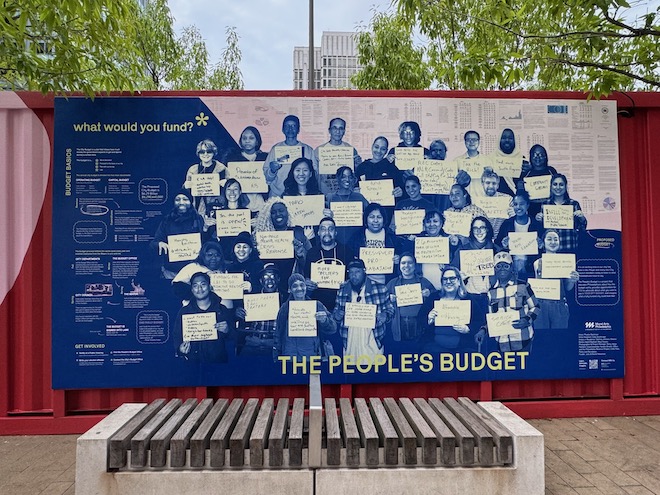
Now in its fourth year, The People’s Budget currently has a pop-up office open three days a week in LOVE Park. Anyone can stop by the People’s Budget Office to learn about Philadelphia’s budget in an informal context, imagine what their ideal city budget would look like, or even collaborate with the Office’s artists-in-residence. The People’s Budget Office is open at LOVE Park through June 21 (12-6 Tuesdays and Wednesdays, as well as 12-4 on Saturdays).
As part of a partnership with Forman Arts Initiative, the Citizen caught up with Bachman. The interview has been condensed and edited for clarity.
RJ Rushmore: How do you describe the office and workings of The People’s Budget?
The office is a physical installation in a retrofitted shipping container. People come in, learn about how the city budget works, and tell us their funding priorities. There are also annual artist residencies where residents do a deep dive into specific departments or issues within the budget. This year we have Sterling Johnson, Eleanor Barba, Ingrid Raphaël and Illkya Acosta.
The budget provides great raw material for artistic exploration. This year we will have comic books and collective mapping.
Why should regular Philadelphians visit you at LOVE Park?
This is an opportunity to understand a very complex document. It’s also a way to share what you think is important within the city budget. Come by LOVE Park, learn about what City Council is working on, and share where you think they should be prioritizing. The budget impacts everyone, and this is an opportunity for people to give feedback.
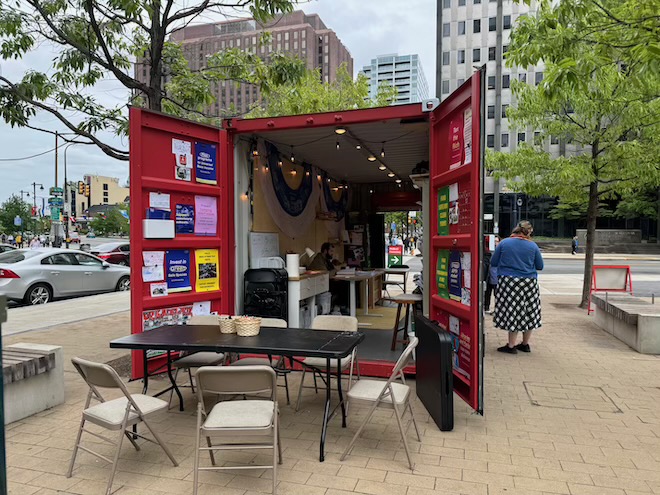
Where does all that feedback go? What sorts of things have you heard in prior years?
Over the last few years, we have been working closely with the City’s Budget Office and City Council members. At the end of the spring, we will create a report that gets shared with both of these groups. Each year, we hear a lot of the same things — more funding for Parks & Recreation, Libraries, Education, Homeless Services, and we also hear new priorities, especially with the administrative transition.
This will be your fourth year doing this. Do you feel like the actual Budget Office listens to you?
Oh, yes. That’s been one of the most amazing things about this project. Since the beginning, we’ve had a great partnership with the City’s official Budget Office. They have been incredibly helpful and generous with their knowledge of the budget. They respect how we go out into the community, and they continue to include the funding priorities we gather in their budget engagement reports.
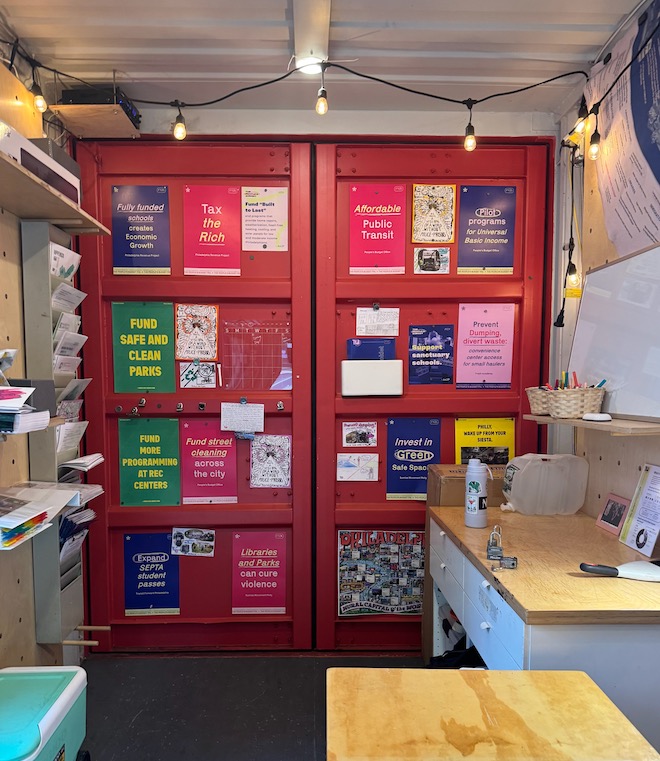
Why include artists in this bureaucratic process?
It’s a great question. Art can be so many different things. Many parts of the city’s budget are hidden from view. One of my roles is exploring: How do we uncover this, or how do we make this information more accessible? What can be done to break down this complex thing in a way where it becomes tangible and understandable?
Last year, Erik Ruin did a project with People’s Budget Office about the library closures that happened in 2008 under the Nutter administration. He interviewed people who organized to save the libraries and interpreted their stories into beautiful screenprints, papercuts and a ’zine. Art is a different way of understanding how these numbers affect our lives.
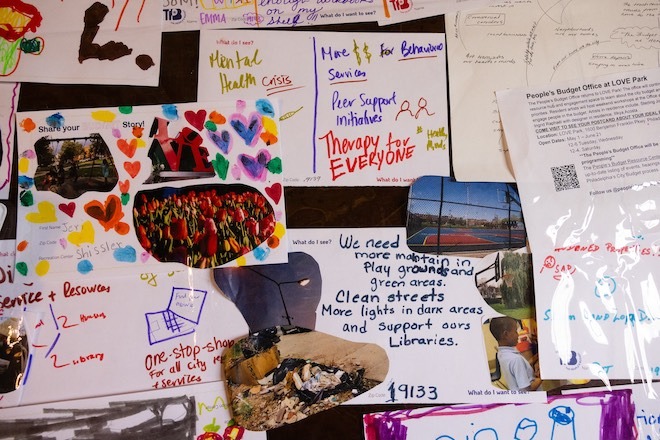
Projects like the People’s Budget Office are categorized as “social practice art.” To someone who thinks of paintings and sculptures as what art is, this might just look like community organizing or constituent outreach. Phoebe, are you an artist?
Yes, I identify as an artist. I studied sculpture at Tyler with a certificate in community arts. When the Arab Spring and Occupy Wall Street happened, I wanted to figure out how art could open up a wider dialogue about the issues I cared about. To me, art is a vehicle for change. It asks us to pay attention, question and imagine.
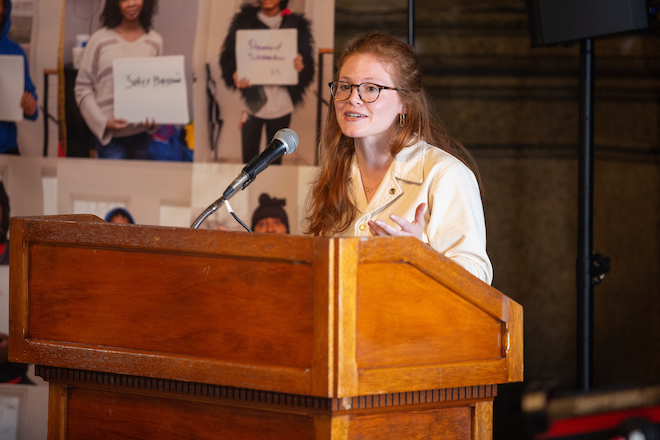
Positioning the People’s Budget Office as an art project allows it to move through spaces that an advocacy or activist project wouldn’t be able to. Social practice is sometimes seen as replacing a social service. But I think it occupies this other space, a space of the “otherwise,” an “unknown” that doesn’t necessarily have an outcome. What it does need to do is build trust, build respect and give us opportunities to see the world differently.
Art is an effective strategy because it can be disarming. It is a space where folks are more willing to interact because it isn’t necessarily someone telling them what they’re supposed to say. We just try to provide a platform for folks to say what they want to say.
So you’re tricking us all into engaging more with city government?
Yes. Exactly.
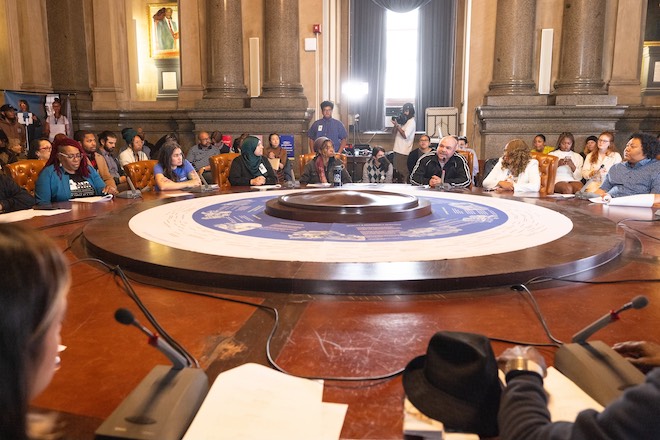
I think that’s beautiful. What are your own personal funding priorities?
The arts are so underfunded in Philadelphia. While people may think that arts are a luxury, culture is integrated into our everyday lives. Some of us are advocating for 1 percent of the city budget to go to the arts, which would be a little over $60 million annually. It would make a huge difference.
If you had a meeting with Mayor Parker, what would you say to her?
There are so many important issues facing our city every day including gun violence, education, arts funding, repairing infrastructure, health and housing to mention a few. While I have my personal priorities, at the end of the day I would advocate for Mayor Parker to listen, not just to those who agree with her budget proposal but to those who don’t. Our government is in a huge moment of transition and people should feel empowered to see themselves in this new administration.
Correction: A previous version of this post contained two captions with the wrong first name of the artist.
RJ Rushmore is a writer, curator and public art advocate. He is the founder of the street art blog Vandalog and culture-jamming campaign Art in Ad Places. As a curator, he has collaborated with Poster House, Mural Arts Philadelphia, The L.I.S.A. Project NYC and Haverford College. Rushmore’s writing has appeared in Hyperallergic, Juxtapoz, Complex and numerous books. He holds a B.A. in Political Science from Haverford College, where his thesis investigated controversies in public art.
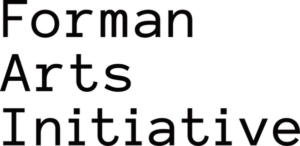
This story is part of a partnership between The Philadelphia Citizen and Forman Arts Initiative to highlight creatives in every neighborhood in Philadelphia. It will run on both The Citizen and FAI’s websites.
![]() MORE FROM OUR ART FOR CHANGE SERIES
MORE FROM OUR ART FOR CHANGE SERIES



